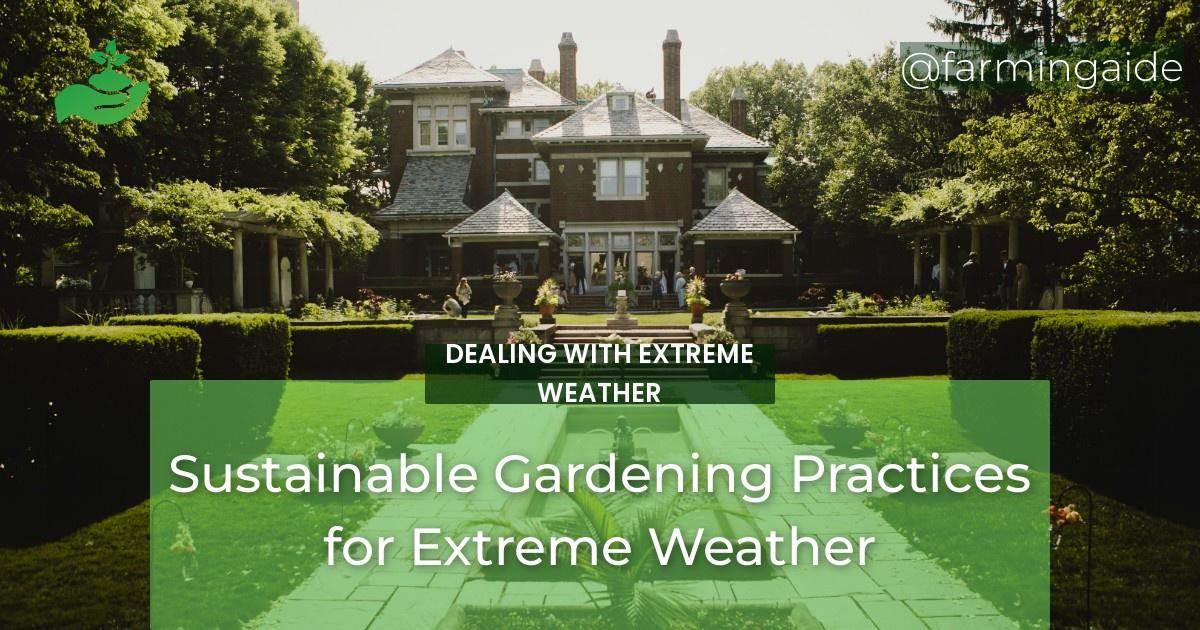Sustainable gardening practices are becoming increasingly important as extreme weather events become more frequent and severe. With rising global temperatures and unpredictable weather patterns, it is crucial for gardeners to adopt sustainable methods to protect their gardens and the environment. In this article, we will explore the benefits of sustainable gardening, provide tips on how to create a sustainable garden, and highlight the importance of these practices during extreme weather conditions.
Table of Contents
Benefits of Sustainable Gardening
Sustainable gardening practices not only benefit the environment, but they also have a positive impact on our health and well-being. By creating a sustainable garden, you are reducing your carbon footprint, conserving water, promoting biodiversity, improving soil health, and producing healthy and nutritious food for yourself and your community.
Reducing Carbon Footprint
Traditional gardening methods, such as the use of synthetic fertilizers and pesticides, contribute to greenhouse gas emissions and contribute to climate change. By opting for sustainable practices, such as using natural fertilizers and practicing crop rotation, you can significantly reduce your carbon footprint and help mitigate the effects of climate change.
Conserving Water
Water scarcity is a pressing issue in many parts of the world, and unsustainable gardening practices, such as excessive watering, contribute to this problem. By choosing native and drought-resistant plants and implementing rainwater harvesting techniques, you can conserve water and reduce your water usage in the garden.
ALSO READ
Promoting Biodiversity
Incorporating a variety of plants in your garden can promote biodiversity and attract beneficial insects and pollinators. This not only creates a more vibrant and diverse ecosystem but also helps to control pests and improve crop yields.
Improving Soil Health
Sustainable gardening practices, such as using organic and natural fertilizers, can help improve the health of your soil. By avoiding the use of synthetic chemicals, you can maintain a healthy balance of nutrients in the soil and promote the growth of beneficial microorganisms.
ALSO READ
Producing Healthy and Nutritious Food
By avoiding the use of harmful chemicals, sustainable gardening practices can produce healthier and more nutritious food. This is not only beneficial for your own health but also for the health of the environment and the local community.
Tips for Creating a Sustainable Garden
Creating a sustainable garden may seem daunting, but with these simple tips, you can easily incorporate sustainable practices into your gardening routine.
Choose Native and Drought-Resistant Plants
Native plants are well adapted to the local climate and require less water and maintenance. By choosing plants that are naturally suited to your region, you can conserve water and reduce the need for fertilizers and pesticides.
Use Organic and Natural Fertilizers
Instead of using synthetic fertilizers, opt for organic and natural alternatives, such as compost and manure. These not only provide essential nutrients for your plants but also help improve soil health and reduce the risk of water pollution.
Implement Rainwater Harvesting
Collecting rainwater is an excellent way to conserve water and reduce your water bill. You can use rain barrels or install a rainwater harvesting system to collect rainwater for your garden.
Practice Companion Planting
Companion planting involves growing different types of plants together to benefit each other. For example, planting marigolds with tomatoes can help repel pests, while planting beans with corn can improve soil health.
Encourage Beneficial Insects and Pollinators
By creating a diverse and welcoming environment, you can attract beneficial insects and pollinators to your garden. These creatures play a crucial role in maintaining a healthy ecosystem and can help control pests and improve crop yields.
Utilize Mulch and Compost
Using mulch and compost can help conserve water, suppress weeds, and improve soil health. Mulch helps to retain moisture in the soil, while compost provides essential nutrients for plant growth.
Rotate Crops and Practice Crop Diversity
Rotating crops and practicing crop diversity can help improve soil health and reduce the risk of pests and diseases. By rotating crops, you can also prevent soil depletion and maintain a healthy balance of nutrients in the soil.
Importance During Extreme Weather
Sustainable gardening practices are especially crucial during extreme weather conditions, such as heatwaves, floods, heavy rains, and strong winds. These practices can help mitigate the effects of extreme weather events and protect your garden from damage.
Mitigating the Effects of Heat Waves
During heatwaves, sustainable gardening practices, such as mulching and planting heat-tolerant crops, can help protect your plants from heat stress and maintain soil moisture.
Protecting Against Floods and Heavy Rains
In areas prone to flooding and heavy rains, sustainable gardening practices, such as using raised beds and proper drainage, can help prevent waterlogging and protect your plants from drowning.
Preventing Erosion During Strong Winds
Strong winds can cause erosion and damage to your garden. By incorporating sustainable practices, such as using windbreaks and planting cover crops, you can protect your garden from erosion and maintain soil health.
Providing Shade and Cooling During Heatwaves
Sustainable gardening practices, such as planting trees and creating shade structures, can provide much-needed shade and cooling during heatwaves. This not only helps to protect your plants but also provides a comfortable outdoor space for you to enjoy.
Reducing Water Runoff and Preventing Waterlogging
Sustainable gardening practices, such as using permeable surfaces and creating rain gardens, can help reduce water runoff and prevent waterlogging during heavy rains. This not only protects your garden but also helps to prevent water pollution.
Creating a Resilient and Adaptable Garden Ecosystem
By incorporating sustainable gardening practices, you are creating a resilient and adaptable garden ecosystem that can better withstand extreme weather events. This not only benefits your garden but also contributes to the health and well-being of the environment.
Conclusion
Sustainable gardening practices are essential for protecting our gardens and the environment during extreme weather conditions. By incorporating these practices into our gardening routine, we can reduce our carbon footprint, conserve water, promote biodiversity, and create a resilient and adaptable garden ecosystem. So, let’s do our part to create a healthier and more sustainable future for ourselves and the planet.


